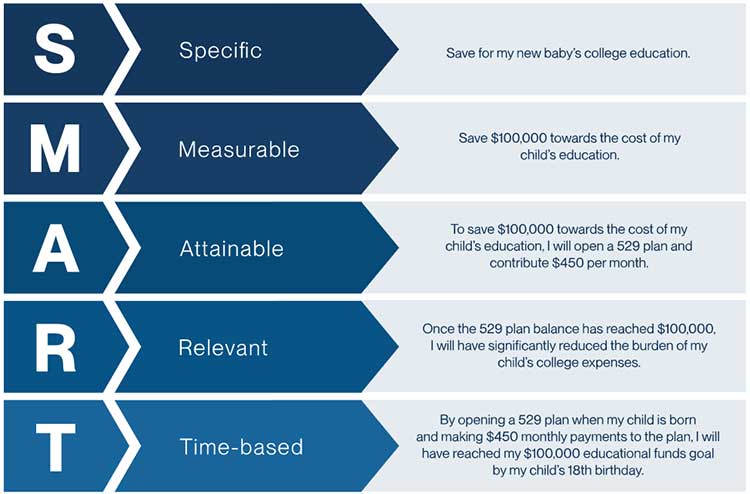Key takeaways
-
Addressing your personal finances need not be an overwhelming chore that’s avoided at all costs.
-
Creating specific, measurable, actionable, relevant and time-based goals can help you maintain your financial plans without a substantial investment of time and effort.
-
The ten straightforward steps below can help you get your personal finances on track without neglecting your other critical tasks.
Often personal finances take a back seat to the financial needs of your business. As you tackle the daily challenges at your organization, there may be little time and energy left to tend to your own needs, such as tax strategy, estate plans and annual budgeting tasks. As challenging as it can be to make the time, it's prudent to revisit your financial plans at least once a year as well as during significant milestones such as having children, getting married/divorced or when changing banks.
Fortunately, even during these times, addressing your financial plans need not be an overwhelming chore. With a bit of guidance, you can get your personal finances on track and keep things current without a substantial time investment. The ten steps outlined below can help you get started today.
1. Set financial goals
Before you delve into planning or meet with a wealth advisor, we recommend you first spend some time assessing your financial goals. What do you want to accomplish? Who or what do you need to protect? Do you have the liquidity you need? What type of relationship would you like to have with your wealth advisor?
Next, consider your time frame for both long- and short-term goals. Your time horizon will greatly influence your alternatives and the urgency of your actions. Finally, remember to make SMART — specific, measurable, actionable, relevant and time-based — goals. By doing so, you and your advisor or family member can ensure that you remain accountable to your objectives as time progresses.
Related read: Are you investing towards your goals?
2. Finalize your budget
Regardless of how detailed, the very act of creating a budget and understanding where your funds flow regularly is illuminating. Although it may feel a bit restrictive at times, having a basic personal budget to periodically reference can help you plan your resource allocations and reductions. According to Kiplinger's, many ultra-high net worth individuals underestimate what they spend by 25 percent.1
Reviewing your budget on a monthly basis highlights the areas where overspending occurs. You can then make the applicable adjustments.
Related read: Short-term liquidity options: what are your choices?
3. Understand your company ownership status
Whether you’re a founder or an employee, it is important to understand the structure of your ownership in your company and if the Qualified Small Business Stock (QSBS) applies. If you are unfamiliar with Qualified Small Business Stock, please read our QSBS article that will help provide more background on the topic. Also, in conjunction with budgeting and stock option status, it is important to understand the potential tax consequences of laying out and exercising a plan that potentially helps mitigate taxes and yields a great after-tax result to you and your family.
4. Establish or revisit your estate plan
We understand the time and sacrifice it takes to grow a business and how little time is left to spend with family and friends, let alone tend to your personal finances. While free time is limited, estate planning should not be left for a rainy day. Having a foundational estate plan in place gives your loved ones clear instructions regarding your wishes should anything happen to you. If you have an estate plan in place, we recommend reviewing the documents every three to five years, or after each life event (marriage, birth of a child, etc.) to ensure your plans remain aligned with your wishes.
If you would prefer to have professional help with the management of your estate plan, we can lend a hand. Simply contact an SVB Private trust & fiduciary advisor to discuss your current goals.
While reviewing your basic documents, consider whether or not a Trust may help you achieve certain objectives. Trusts can be used in a variety of situations — not solely for estate planning purposes. If you need to strengthen your asset protection or strictly allocate certain resources, a trust can be well-suited for the task. Speak with your attorney or an SVB Private trust & fiduciary advisor for direction here.
5. Prioritize your philanthropic giving
Is philanthropy integral to your life or business? If you've taken a largely ad hoc view in your charitable work, now may be the time to be more purposeful. By pulling together the contribution records for all the organizations you regularly contribute to, you'll gain a better view of what your charitable goals are and what needs to be re-structured and/or revisited.
If you would like a roadmap to help solidify your philanthropic plans, read our article, “Five steps to more strategic, effective philanthropic giving.”
6. Compile your legal documents
If you're trying to get your finances in order, be sure to keep all your essential legal documents in a central, yet secure location. While many may keep their business documents in pristine order, sometimes personal documents need a bit more organizing. If you have critical documentation in a bank safe deposit box or with your attorney, make sure that a trusted loved one has access to copies.
7. Adjust your tax strategy
A downturn in the economy may have unrealized tax benefits. Now is the time to revisit your tax strategy and review your tax planning. It may make sense to sell a holding or asset to capture the loss, accelerate distributions from retirement accounts, consider Roth conversions or adjust your quarterly estimated tax payments. Your tax attorney or CPA can assist you.
Related read: Managing your money in economic downturns: A financial planning guide for turbulent markets
8. Review your insurance coverage
If you have had a significant life transition such as a change in employment, marital status or residence over the past year or more, you'll want your insurance to reflect those changes. Confirm that your insurance still provides sufficient assets and personal protection. Also, if the values of some assets have changed, you may need to update the applicable policies.
9. Request a copy of your credit report annually
Did you know you are entitled to one free credit report from each of the three major credit reporting bureaus each year? It's important to review your credit report each year for accuracy, as errors can ultimately cost you a loan, result in higher interest rates or disqualify you from a job. Although ranges vary depending on the credit scoring model, generally credit scores from 580 to 669 are considered fair; 670 to 739 are considered good; 740 to 799 are considered very good; and 800 and up are considered excellent.2
You may order a copy of your credit report online at annualcreditreport.com or by calling 1-877-322-8228. While you can order all three free credit reports at one time, we recommend staggering them out over the course of the year. Keep an eye out for anything that looks suspicious, such as a new credit inquiry or a new account and contact the credit bureau directly to correct any issues.
10. Refine your personal financial plan with a team of professionals
An effective financial plan requires some thought and expertise. Contact your SVB Private wealth advisor for best practice advice. As your primary contact, your wealth advisor helps guide and connect you with the professionals needed. At SVB Private, we are here to help you with your personal financial planning at every life stage.
Sources
1https://www.kiplinger.com/article/retirement/t047-c032-s014-wealthy-people-need-budgets-too.html
2https://www.equifax.com/personal/education/credit/score/what-is-a-good-credit-score/#:~:text=Although%20ranges%20vary%20depending%20on,and%20up%20are%20considered%20excellent















